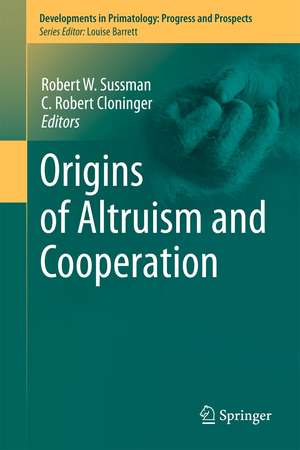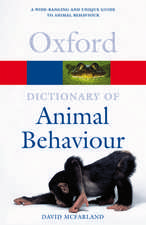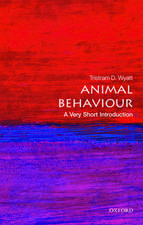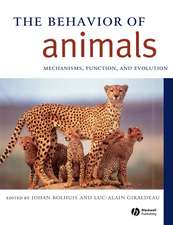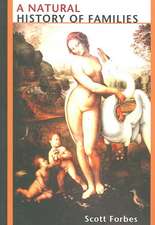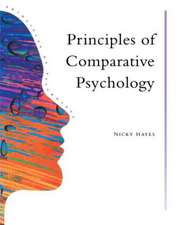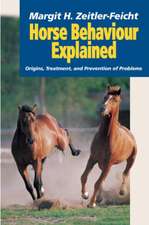Origins of Altruism and Cooperation: Developments in Primatology: Progress and Prospects, cartea 36
Editat de Robert W. Sussman, C. Robert Cloningeren Limba Engleză Paperback – 24 oct 2013
| Toate formatele și edițiile | Preț | Express |
|---|---|---|
| Paperback (1) | 952.09 lei 6-8 săpt. | |
| Springer – 24 oct 2013 | 952.09 lei 6-8 săpt. | |
| Hardback (1) | 954.45 lei 6-8 săpt. | |
| Springer – 2 aug 2011 | 954.45 lei 6-8 săpt. |
Din seria Developments in Primatology: Progress and Prospects
- 20%
 Preț: 571.32 lei
Preț: 571.32 lei - 18%
 Preț: 1216.65 lei
Preț: 1216.65 lei - 19%
 Preț: 578.67 lei
Preț: 578.67 lei - 18%
 Preț: 956.69 lei
Preț: 956.69 lei - 18%
 Preț: 948.92 lei
Preț: 948.92 lei - 18%
 Preț: 948.92 lei
Preț: 948.92 lei - 18%
 Preț: 945.79 lei
Preț: 945.79 lei - 18%
 Preț: 962.66 lei
Preț: 962.66 lei - 18%
 Preț: 1664.43 lei
Preț: 1664.43 lei - 18%
 Preț: 1224.54 lei
Preț: 1224.54 lei - 24%
 Preț: 826.26 lei
Preț: 826.26 lei - 24%
 Preț: 802.76 lei
Preț: 802.76 lei - 18%
 Preț: 1562.94 lei
Preț: 1562.94 lei - 18%
 Preț: 950.21 lei
Preț: 950.21 lei - 18%
 Preț: 943.73 lei
Preț: 943.73 lei - 18%
 Preț: 1549.67 lei
Preț: 1549.67 lei - 18%
 Preț: 1248.20 lei
Preț: 1248.20 lei - 18%
 Preț: 941.38 lei
Preț: 941.38 lei - 24%
 Preț: 800.87 lei
Preț: 800.87 lei - 18%
 Preț: 953.35 lei
Preț: 953.35 lei - 18%
 Preț: 1827.48 lei
Preț: 1827.48 lei - 18%
 Preț: 1209.52 lei
Preț: 1209.52 lei - 18%
 Preț: 957.62 lei
Preț: 957.62 lei - 18%
 Preț: 1231.47 lei
Preț: 1231.47 lei - 18%
 Preț: 1225.48 lei
Preț: 1225.48 lei - 5%
 Preț: 1433.83 lei
Preț: 1433.83 lei - 18%
 Preț: 1231.16 lei
Preț: 1231.16 lei - 18%
 Preț: 1226.90 lei
Preț: 1226.90 lei - 18%
 Preț: 955.25 lei
Preț: 955.25 lei - 18%
 Preț: 956.03 lei
Preț: 956.03 lei - 18%
 Preț: 1218.53 lei
Preț: 1218.53 lei - 18%
 Preț: 950.52 lei
Preț: 950.52 lei -
 Preț: 416.82 lei
Preț: 416.82 lei - 18%
 Preț: 1554.89 lei
Preț: 1554.89 lei
Preț: 952.09 lei
Preț vechi: 1161.08 lei
-18% Nou
Puncte Express: 1428
Preț estimativ în valută:
182.21€ • 189.52$ • 150.42£
182.21€ • 189.52$ • 150.42£
Carte tipărită la comandă
Livrare economică 12-26 aprilie
Preluare comenzi: 021 569.72.76
Specificații
ISBN-13: 9781461429869
ISBN-10: 1461429862
Pagini: 456
Ilustrații: XVI, 440 p.
Dimensiuni: 155 x 235 x 24 mm
Greutate: 0.64 kg
Ediția:2011
Editura: Springer
Colecția Springer
Seria Developments in Primatology: Progress and Prospects
Locul publicării:New York, NY, United States
ISBN-10: 1461429862
Pagini: 456
Ilustrații: XVI, 440 p.
Dimensiuni: 155 x 235 x 24 mm
Greutate: 0.64 kg
Ediția:2011
Editura: Springer
Colecția Springer
Seria Developments in Primatology: Progress and Prospects
Locul publicării:New York, NY, United States
Public țintă
GraduateCuprins
Part I. Cooperation, Altruism and Human Evolution.- Chapter 1-Introduction: Altruism and Cooperation.- Chapter 2. Part 1 Introduction.-Chapter 3. The Influence of Predation on Primate and Early Human Evolution: Impetus for Cooperation.- Chapter 4. Born to cooperate? Altruism as exaptation, and the evolution of human sociality.- Chapter 5. The Phylogenesis of Human Personality:Identifying the Precursors of Cooperation, Altruism, and Well-Being.- Part II. Altruism and Cooperation Among Non-human Primates.- Chapter 6. Cooperation and the Evolution of Social Living: Moving Beyond the Constraints andImplications of Misleading Dogma: Introduction Section II.- Chapter 7. Primates, Niche Construction, and Social Complexity: The Roles of Social Cooperation and Altruism.- Chapter 8. Collective Action and Male Affiliation in Howler Monkeys (Alouatta caraya).- Chapter 9. Mechanisms of Cohesion in Black Howler Monkeys.- Chapter 10. Social Plasticity and Demographic Variation in Primates.- Part III. Altruism and Cooperation Among Humans: The Ethnographic Evidence.- Chapter 11. Altruism and Cooperation Among Humans: The Ethnographic Evidence: Introduction.- Chapter 12. Violence Reduction among the Gebusi of Papua New Guinea – and Across Humanity.- Chapter 13. Human Nature: The Nomadic Forager Model.- Chapter 14. Born to Live: Challenging Killer Myths.- Chapter 15. Notes toward a human nature for the third Millennium.- Part IV. Neurological and hormonal mechanisms for cooperation and altruism.- Chapter 16. Behavior meets Neuroscience: Achievements, Prospects, and Complexity: Introduction to Section 4.- Chapter 17. The Neurobiology of Cooperation and Altruism.- Chapter 18. Behavioral and Neuroendocrine Interactions in Affiliation.- Chapter 19. Early Social Experience and the Ontogenesis of Emotion Regulatory Behavior in Children.- Part V. Human Altruism and Cooperation: Needs and the Promotion of Well-being in Modern Life.- Chapter 20:Introduction.- Chapter 21. Altruism as an Aspect of Relational Consciousness and how Culture inhibits it.- Chapter 22. Hope Rekindled: Well-Being, Humanism, and Education.- Chapter 23. Promoting Well-Being in Health Care.- Chapter 24. Moving Beyond the Nature/Nurture Distinction: Promotion of Transdisciplinary Research (Overview of the Institute of Medicine Report on Genes, Behavior, and the Social Environment).
Recenzii
From the reviews:
“Origins of Altruism and Cooperation presents an avalanche of information and perspectives that can at times be overwhelming, a number of important themes emerge from the diverse material discussed by these many authors. First and foremost, evidence provided throughout the book makes it clear that new evolutionary theories are needed to explain the nature and extent of cooperation in the primate lineage, most prominently among human beings. … this book should be of particular interest to anyone seeking to formulate new evolutionary models.” (Christopher X. Jon Jensen, The Quarterly Review of Biology, Vol. 88 (3), September, 2013)
“The book does three things that many of the other books on this subject don’t do: it gives some background about altruism and cooperation in specific non-human primate species, it reviews the neuroscience behind these behaviors, and it shows the practical applications of altruism and cooperation in such things as education and healthcare. … it is a convenient source for a researcher or someone who is reviewing the literature. … It would be a useful contribution to a university library.” (Jay R. Feierman, ESSSAT-News, Vol. 22 (2), June, 2012)
“Origins of Altruism and Cooperation presents an avalanche of information and perspectives that can at times be overwhelming, a number of important themes emerge from the diverse material discussed by these many authors. First and foremost, evidence provided throughout the book makes it clear that new evolutionary theories are needed to explain the nature and extent of cooperation in the primate lineage, most prominently among human beings. … this book should be of particular interest to anyone seeking to formulate new evolutionary models.” (Christopher X. Jon Jensen, The Quarterly Review of Biology, Vol. 88 (3), September, 2013)
“The book does three things that many of the other books on this subject don’t do: it gives some background about altruism and cooperation in specific non-human primate species, it reviews the neuroscience behind these behaviors, and it shows the practical applications of altruism and cooperation in such things as education and healthcare. … it is a convenient source for a researcher or someone who is reviewing the literature. … It would be a useful contribution to a university library.” (Jay R. Feierman, ESSSAT-News, Vol. 22 (2), June, 2012)
Textul de pe ultima copertă
This book is derived from a conference held at Washington University, March, 2009. Authors include academics from around the world and across multiple disciplines – anthropology, psychiatry, human evolution, biology, psychology, religion, philosophy, education, and medicine – to focus on the evolution of cooperation, altruism, and sociality and possible factors that led to the evolution of these characteristics in non-human primates and humans.
.
The traits of altruism and cooperation often are assumed to be among humanity's essential and defining characteristics. However, it has been difficult to account for the origins and evolution of altruistic behavior. Recently, scientists have found data on cooperative behavior in many animal species, as well as in human societies, that do not conform to evolutionary models based solely on competition and the evolutionary drive to pass on selfish genes. In this volume, recent debates about the nature and origins of cooperative behaviors are reviewed. The hypothesis that unselfish cooperative behavior has evolved in animals that live in social groups is discussed. Many of the mechanisms that primates and humans have evolved for protection against predators, including cooperation and sociality are explored.
Social animals, including primates and humans, are not forced to live socially but do so because it benefits them in numerous ways. Through natural selection, primates and humans have developed areas of the brain that respond with pleasure and satisfaction to being cooperative and friendly, even if cooperation involves personal sacrifice. Data are presented supporting the idea that the normal pattern for most diurnal primates and for humans is to be social. Selfishness and aggression are expressions of adaptive responses that are well-regulated in mature and healthy people with the benefit of mechanisms of social evolution in primates. People becomenon-cooperative and express antisocial behavior as a result of faulty or incomplete development of their natural potential for cooperation and altruism. It is human nature to want to work together and cooperate. A hypothesis is developed and explored that positive social interaction is related to well-being in both non-human primates and in humans.
.
The traits of altruism and cooperation often are assumed to be among humanity's essential and defining characteristics. However, it has been difficult to account for the origins and evolution of altruistic behavior. Recently, scientists have found data on cooperative behavior in many animal species, as well as in human societies, that do not conform to evolutionary models based solely on competition and the evolutionary drive to pass on selfish genes. In this volume, recent debates about the nature and origins of cooperative behaviors are reviewed. The hypothesis that unselfish cooperative behavior has evolved in animals that live in social groups is discussed. Many of the mechanisms that primates and humans have evolved for protection against predators, including cooperation and sociality are explored.
Social animals, including primates and humans, are not forced to live socially but do so because it benefits them in numerous ways. Through natural selection, primates and humans have developed areas of the brain that respond with pleasure and satisfaction to being cooperative and friendly, even if cooperation involves personal sacrifice. Data are presented supporting the idea that the normal pattern for most diurnal primates and for humans is to be social. Selfishness and aggression are expressions of adaptive responses that are well-regulated in mature and healthy people with the benefit of mechanisms of social evolution in primates. People becomenon-cooperative and express antisocial behavior as a result of faulty or incomplete development of their natural potential for cooperation and altruism. It is human nature to want to work together and cooperate. A hypothesis is developed and explored that positive social interaction is related to well-being in both non-human primates and in humans.
Caracteristici
This book is about the evolution and nature of cooperation and altruism in social-living animals, focusing especially on non-human primates and on humans The anthropological, primatological, paleontological, behavioral, neurobiological, and psychological evidence provided in this book gives a more optimistic view of human nature than the more popular, conventional view of humans being naturally and basically aggressive and warlike Provides a compact, accessible, and up-to-date account of the current scholarly advances and debates in this field of study Includes supplementary material: sn.pub/extras
